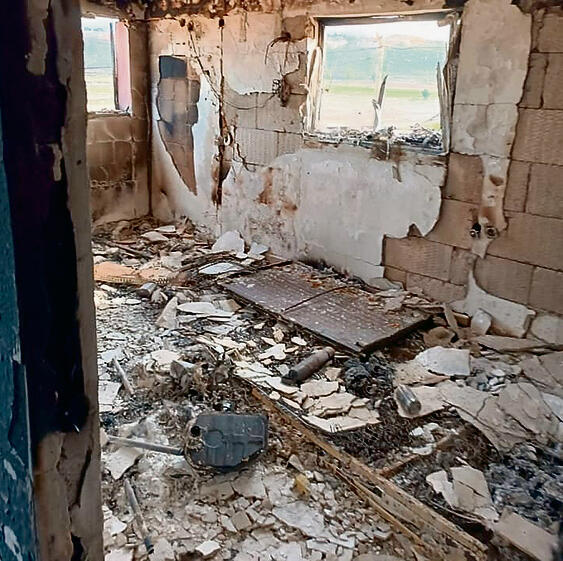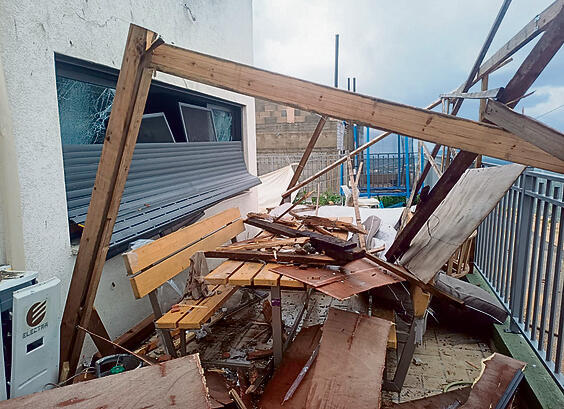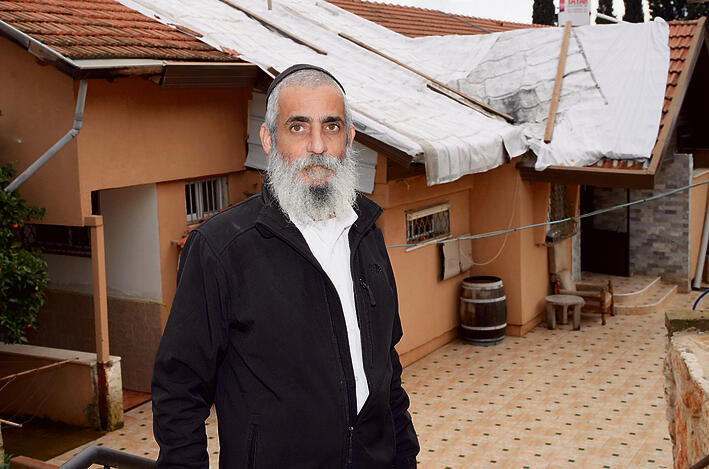October 7 brought about an escalation in Hezbollah's attacks on border towns, causing widespread distress and uncertainty among the residents. While the focus often centers on the reports of "Hezbollah firing" along the northern border, it is crucial to recognize the profound impact these attacks have had on the lives of families living in the area.
Read more:
Families from Kiryat Shmona, Shtula, Metula and Kibbutz Dafna have been thrust into the conflict, their lives abruptly upended by the destruction that has befallen their homes. Their experiences serve as a stark reminder of the human cost of ongoing hostilities and the challenges they now face as they navigate an uncertain future.
Impact of missile in Kfar Yuval
On December 11, a devastating incident occurred when an anti-tank missile pierced through the residence of the Belsky family in Metula. The second floor of their home was completely destroyed, while the first floor also sustained severe damage. Due to the prevailing danger posed by Hezbollah's terror squads, the family has been unable to safely access and assess the extent of the destruction.
Lifetime worth of memories engulfed in flames
Naama Belsky, the daughter of this long-time farming family and a fourth-generation member of the Zionist community, vividly describes the situation. "We have no idea about the condition of the house, but from the photographs we have seen it is evident that the damage is incredibly severe. We are essentially left with nothing. An entire lifetime of memories went up in flames," she said, recounting the loss of three generations of the Belsky family and their cherished establishment, the Arazim Hotel in Metula, which was consumed by the fire.
Due to the imminent danger, neither the family members nor contractors can access the house, let alone secure it to prevent further damage. They are aware that the process of rehabilitating their 2,475-square-foot home will be time-consuming. "Even when everyone returns home, we have no place to return to. We'll have to dismantle, rebuild and restore what we had," explained Belsky.
Despite the loss of property caused by Hezbollah's fire, she emphasizes her determination not to abandon their long-established community. "We won't allow Hezbollah to win, and Metula has been and will continue to be our home for future generations. My late father purchased and constructed this house for me when I was 18. We understand that living on the border comes with a price, but the country should provide us with absolute security, not just a sense of security. I hope they find a way to restore it to us. Personally, I believe the residents of Metula should not have been evacuated. Perhaps we wouldn't find ourselves in this situation today if that had been the case."
The sheer power of a Kornet missile
At noon on Saturday, the Bitton family's residence in Shtula stood vacant when the Kornet missile pierced through it, obliterating everything in its path until it emerged from the opposite side.
Yosef Haim, a father of five children, expressed his astonishment. "I can't believe the power of this missile, even just from its tip. If it had detonated inside the house, the damage would have been even more devastating." The Bitton family had only recently moved into their home approximately two months prior to the outbreak of the war, during which they also established a local Chabad chapter. Earlier this week, Yosef Haim visited the site to assess the extensive damage caused by the missile strike.
"I was certain that, upon arrival, I would find utter destruction, but it was nothing short of a miracle. The missile entered through one side of the house, going right through it, piercing through all the walls along its path, leaving shaved walls and furniture in its wake, and exiting through a window on the other side," he describes in awe.
"All the windows in the house shattered, along with most of the blinds. The doors were lodged off their hinges, sinks and furniture were broken. Even in the yard, far from the missile's impact, the storage shed completely collapsed from the force. Everything that remained untouched was covered in heavy dust and shards of glass. We don't even know where to begin in terms of restoration, cleaning and tidying up," he added.
When the war broke out, the family made the decision to evacuate their home and seek refuge in Safed until things settled down. They received the devastating news about their house being destroyed at the end of last Shabbat.
"I truly believe that we were saved not once, but twice. First, on October 7, when experts predicted that the attack would target the northern region as well. If that had happened, our entire community would have been completely wiped out. It's evident to me that no force could have stopped Hezbollah's forces. However, by some miracle, we were spared. And even now, we can see God's grace in the fact that we weren't home when the missile struck," another family member said.
In the evening, as tensions escalated in the community, Bitton quickly gathered some of his belongings and left. While listening to a news bulletin on the radio, he heard the mournful voices from the funeral of Mira and Barak Ayalon from Kfar Yuval.
"How can it be that the army, in response to the murder of two innocent civilians, a son and his mother, retaliates by attacking a headquarters and some sort of ammunition depot?" he asked. "Is this the appropriate reaction to harming a man who defended his community and was a member of the emergency team, and his mother, who stayed behind to care for and support his father? It seems like a useless action that won't achieve anything meaningful. Why can't we see that?"
'The whole roof's gotta go'
On Tuesday, amid the pouring rain that drenched the city streets, Mordechai Gabbay struggled to reinforce the nylon sheets he had used to cover the roof of his house, which had been completely destroyed by a direct hit.
"The rocket tore off the roof, causing extensive damage to everything inside the house," Gabbay shares, referring to his childhood home where he currently resides with his elderly father. "An engineer assessed the situation and observed the cracks and severe damage. Due to the rain, moisture seeped in through the roof, causing additional harm. The damage is substantial. The whole roof's gotta go."
Gabbay made the decision to relocate his father to a distant hotel for safety, but he himself refused to leave the house. "I volunteer at the Chabad center every day, helping to distribute food to those in need. I can't help but wonder who will step in and take care of the vulnerable if I'm not there," he explains.
'I honestly don't know if we will return to the north'
On October 7, in a state of panic, the Barlev family - consisting of Noam, Naomi, and their two young children - hastily left their rented house in Kibbutz Dafna. Approximately a month later, they received news that the small house had been struck by an anti-tank missile, resulting in extensive damage.
"A few days later, I returned to gather whatever remained intact, bid farewell to the house, and since then we've been residing in Kfar Yehoshua in the Jezreel Valley," Noam recounts. He shudders at the thought of what could have happened if his family had been present during the missile attack. "Just two seconds after the alarm went off, the missile struck our house. We have no safe room, but rather a communal shelter you have to go to," he explains.
The residents of Kfar Yehoshua in the Jezreel Valley warmly welcomed and supported the evacuated family by providing them with furniture and winter clothing for the children, and helping them with the rest of the necessary items that Noam and Naomi had to purchase again. In March, their three-month-old son will start attending daycare, and their older son has already been successfully integrated into the well-established kindergarten system in the moshav. Reflecting on their uncertain future, Noam sadly shares: "I honestly don't know if we will return to the north. At least until September, we will be staying in the Jezreel Valley area, but beyond that, we will have to wait and see how everything unfolds."
"When you come to this region, you realize the abundant opportunities that exist for young people like us," accordimg to Noam. "My wife is employed in the high-tech industry, and I work in the field of digital marketing. These sectors are not well-developed in the Upper Galilee. However, there's also the concern about security. I'm unsure of what the future holds in that regard. During the Second Lebanon War in 2006, we didn't experience any missile attacks, but now it's a different story. This changes the entire situation. The fear of a situation similar to October 7 will always be on our minds."








